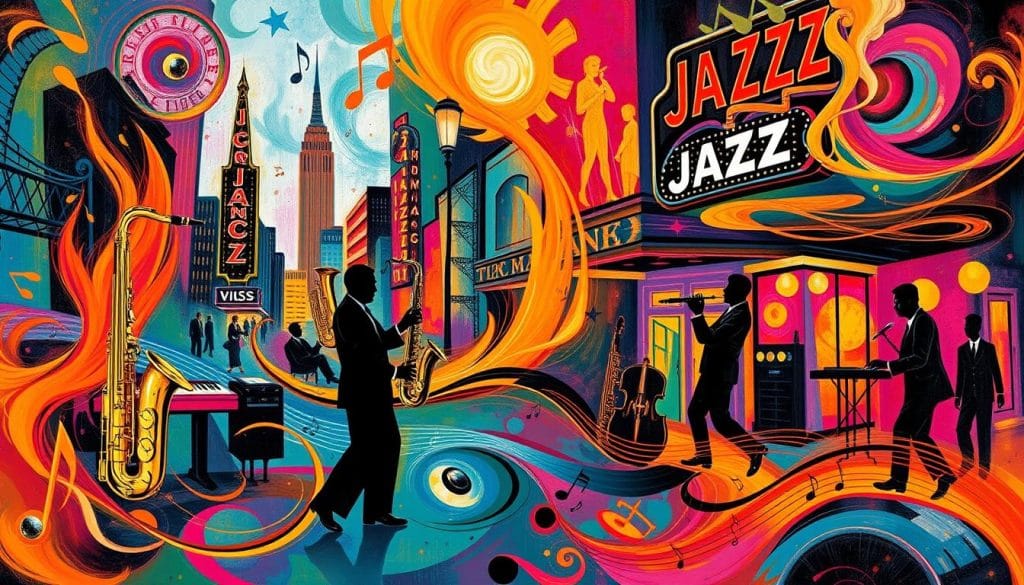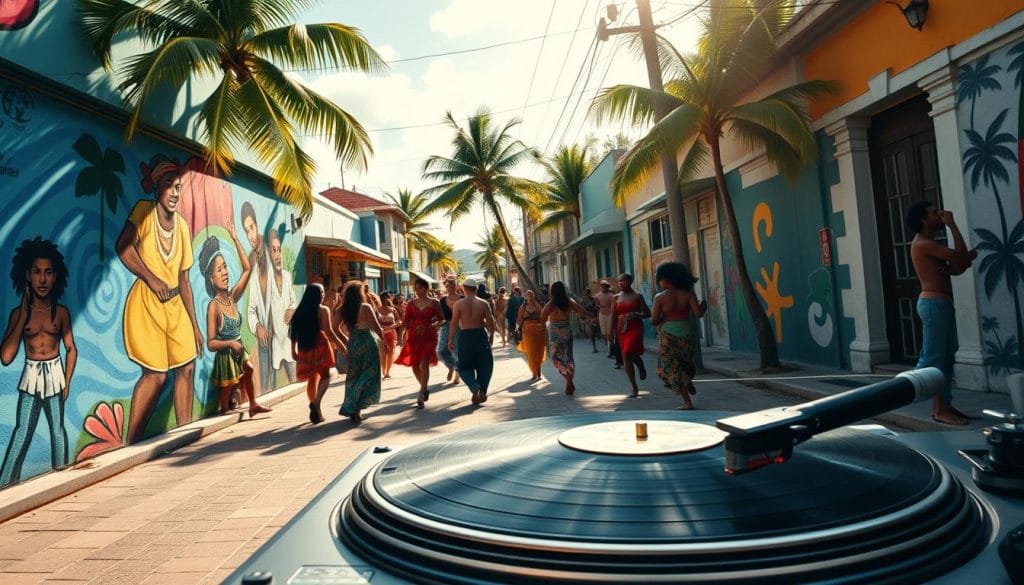A staggering 40% of music in the United States comes from African American musicians. This shows the huge impact of Black History in Music. Black History Month reminds us of the big role African American musicians play in music.
Black music has shaped popular culture in big ways. Its influence goes beyond just entertainment. It inspires new artists in jazz, blues, hip-hop, and R&B. This makes Black music a key part of American music.
Celebrating Black History in Music shows the lasting power of African American musicians. They have always been creative and innovative. By honoring Black music’s history, we also see its ongoing effect on music today.
Key Takeaways
- Black music accounts for a significant portion of music consumption in the United States
- African American musicians have made lasting contributions to the music industry
- Black History in Music is a celebration of the legacy and impact of Black music
- Black culture continues to shape and influence the music industry
- African American musicians have consistently pushed the boundaries of creativity and innovation
- The legacy of Black music serves as a source of inspiration for new generations of artists
The Roots of Black Music in America
Black music has a deep history in America, with many genres adding to its cultural significance. It started with African Americans during slavery, using music to express themselves and keep their culture alive. Genres like spirituals, blues, and folk have greatly shaped American music.
African American music has influenced many areas, including social change and unity. Celebrating Black excellence and pushing for Diversity, Equity, and Inclusion (DEI) in music helps create a fair society. Here are some ways to support DEI in music:
- Supporting Black-owned music venues and festivals
- Amplifying the voices of Black musicians and industry professionals
- Providing chances for Black musicians to show their talents and get noticed
By doing these things, we can make the music industry more just and inclusive. Black music’s cultural significance is clear, and we must keep its legacy alive for future generations.
The Evolution of Jazz
Jazz music has a rich history, starting in African-American communities in the southern United States. It has grown into a unique mix of musical styles. This growth is thanks to influential artists who have explored new sounds. Jazz has been a way for musical pioneers to share their stories and feelings.
The genre has been shaped by many musical traditions, like blues, swing, and bebop. Influential artists such as Louis Armstrong, Duke Ellington, and Miles Davis have greatly influenced jazz. Their work has made jazz a major player in the music world, loved by fans worldwide.

- John Coltrane, known for his innovative and influential saxophone playing
- Billie Holiday, a vocalist who brought a unique sense of phrasing and emotional depth to her performances
- Charlie Parker, a leading figure in the development of bebop and a highly influential saxophonist
Today, jazz is still alive and growing, with new artists adding their own twist. From traditional jazz to fusion and experimental styles, it remains vibrant and dynamic. Jazz continues to captivate audiences globally, showing its lasting appeal.
The Rise of Rhythm and Blues
Rhythm and blues, born from Black music’s evolution, has deeply influenced America’s musical heritage. It started in the 1940s with a soulful sound, focusing on love, heartache, and social issues.
As R&B grew, it became a voice for social change. Artists used their music to talk about racism, inequality, and justice. This raised awareness and united the Black community.
Key Artists Who Shaped R&B
Notable figures like Aretha Franklin, James Brown, and Marvin Gaye shaped R&B. They set the stage for future musicians, defining the genre’s sound and style.
R&B’s Role in Social Change
R&B’s impact on social change is immense. It has tackled issues from civil rights to women’s empowerment. Through their music, artists have pushed for a fairer society.
Today, R&B remains a cornerstone of American music. It inspires new artists and promotes diversity and inclusion. By supporting Black-owned businesses and learning more, we can keep R&B’s legacy alive.
| Artist | Song | Year |
|---|---|---|
| Aretha Franklin | Respect | 1967 |
| James Brown | I Got You (I Feel Good) | 1965 |
| Marvin Gaye | What’s Going On | 1971 |
The Birth of Hip-Hop
Hip-hop started with African American musicians’ creativity and resilience. It’s a powerful way to express oneself and talk about social issues. This genre gives a voice to those who are often ignored.
Important figures like DJ Kool Herc, Grandmaster Flash, and Afrika Bambaataa helped shape hip-hop. Their work laid the foundation for the music we know today. Hip-hop’s lyrics and themes reflect the times, often as a form of protest.
Pioneers of the Genre
- DJ Kool Herc: Known as the “father of hip-hop,” Herc developed the breakbeat DJing style that is still used today.
- Grandmaster Flash: A legendary DJ and producer, Flash is credited with developing the backspin technique and other innovative DJing methods.
- Afrika Bambaataa: A DJ, producer, and activist, Bambaataa is known for his work in promoting peace and unity through hip-hop music.
Hip-Hop’s Cultural Significance
Hip-hop’s impact goes beyond music. It influences fashion, dance, and art. It also brings people together, creating a sense of community and belonging.
| Artist | Song | Release Year |
|---|---|---|
| Public Enemy | “Fight the Power” | 1990 |
| Tupac Shakur | “Changes” | 1998 |
| Kendrick Lamar | “Alright” | 2015 |
Impact of Reggae and Dancehall
Reggae and dancehall have greatly influenced music worldwide. They’ve been a voice for change, touching on topics like equality and freedom. Artists use these genres to share their views and celebrate culture.
Reggae, especially, has a deep history. Legends like Bob Marley and Peter Tosh used their songs to spread messages of unity and love. Their words have touched hearts globally, making reggae a worldwide sensation.
Key Figures in Reggae History
Artists like Toots and the Maytals, Jimmy Cliff, and Burning Spear have shaped reggae. They’ve influenced the genre’s sound and style, opening doors for others.

Reggae’s Global Influence
Reggae’s impact is seen in many music styles, from hip-hop to rock. Bands like The Police and UB40 have been inspired by reggae. They’ve brought its messages of love and justice to more people, enriching music’s heritage.
By honoring reggae and dancehall, we learn about music’s power to inspire. Reggae’s lyrics and rhythms have made a lasting impact on our musical heritage.
The Role of Gospel Music
Gospel music has a big role in Black music history. It started with African-American spirituals and hymns. Musical pioneers used their voices to share faith, hope, and struggles. Gospel music brings people together, offering comfort and a sense of community.
Artists like Mahalia Jackson and Sam Cooke helped shape gospel music. They mixed blues, jazz, and folk to create a special sound. Their work still inspires today’s artists, showing gospel music’s lasting impact.
Historical Significance
Gospel music has been a strong voice for social change. Many artists tackled racism, inequality, and justice through their songs. It reflects the struggles and victories of African-American communities.
Influence on Other Genres
Gospel music’s impact is seen in R&B, hip-hop, and rock. Many influential artists drew from gospel, adding its themes and melodies to their music. This blending has enriched music, creating new styles and sounds.
Gospel music is a key part of Black music heritage. It continues to inspire and uplift people worldwide. Its lasting influence and historical importance ensure gospel music’s role in the music industry for years to come.
Contemporary Black Artists Making Waves
The 21st century has seen a surge in innovative Black artists. They are redefining the music industry. African American musicians like Kendrick Lamar, Beyoncé, and Kanye West are leading the way. They experiment with different genres and collaborate with artists from diverse backgrounds.
Trap and drill music have become popular among Black History in Music fans. Artists like Lil Uzi Vert and Megan Thee Stallion are at the forefront. They use their platforms to promote social justice and empower their communities.
Breakthroughs in the 21st Century
- Kendrick Lamar’s fusion of jazz and hip-hop
- Beyoncé’s incorporation of Afrobeat and R&B
- Kanye West’s experimentation with electronic and soul music
These breakthroughs have paved the way for a new generation of African American musicians. They blend different styles and genres to create something unique. By supporting Black-owned businesses and engaging with educational resources, we can promote DEI initiatives and celebrate Black History in Music.
The Fusion of Genres
The fusion of genres is a hallmark of contemporary Black music. Artists blend different styles to create something new and innovative. This fusion has led to the creation of new sounds and helped break down cultural and social barriers. It promotes unity and understanding among diverse communities.
| Artist | Genre | Notable Works |
|---|---|---|
| Kendrick Lamar | Hip-Hop/Jazz | To Pimp a Butterfly |
| Beyoncé | R&B/Afrobeat | Lemonade |
| Kanye West | Hip-Hop/Electronic | My Beautiful Dark Twisted Fantasy |
The Importance of Music Festivals
Music festivals are key in celebrating Black music heritage. They show the rich culture and music of African American artists. These events unite people worldwide, encouraging cultural exchange and diversity.
At music festivals, you can feel the energy of Black music. From jazz to hip-hop, these events let artists share their talents. They tell their stories and connect with fans. Black musicians’ legacy shows their strength, creativity, and impact on music.
Celebrating Black Music Heritage
Music festivals are great for celebrating Black music. Many focus on its history and influence. Events like the Essence Music Festival and the African American Music Festival highlight Black music’s importance.
Communities and Cultural Exchange
Music festivals help build communities and exchange cultures. They offer a place for diverse people to share and learn. By going to these festivals, you can understand and appreciate Black music more.
| Festival Name | Location | Genre |
|---|---|---|
| Essence Music Festival | New Orleans | R&B, Hip-Hop |
| African American Music Festival | Chicago | Jazz, Blues |
| Black Music Festival | Atlanta | R&B, Hip-Hop |
Supporting music festivals helps celebrate Black music. It promotes cultural and musical heritage. This supports a more inclusive and diverse music scene.
The Future of Black Music
Looking ahead, we see the historical evolution of Black music is key. From jazz and blues to today’s hip-hop and R&B, Black music has always been bold. It has always broken new ground.
Artists like Kendrick Lamar, Beyoncé, and Kanye West have been game-changers. They’ve brought new sounds and styles to the table. Their work has inspired many to try new things.
Here are some trends that will shape Black music’s future:
- The rise of Afrobeat and other African genres
- The increasing popularity of Black music festivals and events
- The growing influence of Black music on mainstream pop culture
The legacy of Black music will keep growing. Musical pioneers will keep pushing the limits. We celebrate Black music’s history and its ongoing influence on today’s music and culture.
| Genre | Description |
|---|---|
| Jazz | A genre characterized by improvisation and syncopated rhythms |
| Blues | A genre originating from African American work songs and spirituals |
| Hip-Hop | A genre that originated in the 1970s, characterized by rhythmic speech and lyrical flow |
Conclusion: Celebrating the Legacy of Black Music
Black music’s rich history and deep impact show it’s worth celebrating and supporting.
Black musicians have always been at the forefront of creativity and change. They’ve left a lasting mark on music. From Aretha Franklin’s soulful songs to Kendrick Lamar’s innovative beats, they’ve given us a legacy that inspires and empowers.
Ways to Support Black Musicians
Supporting Black musicians is a great way to honor their legacy. You can do this by streaming their music, going to their shows, and buying their albums. Also, supporting Black-owned music businesses and labels helps their success.
The Importance of Awareness and Education
It’s also key to learn more about African American artists’ contributions. By using educational resources, attending cultural events, and pushing for diverse school curricula, we can amplify their voices. Understanding Black music’s history and importance helps us celebrate its lasting impact on our world.
